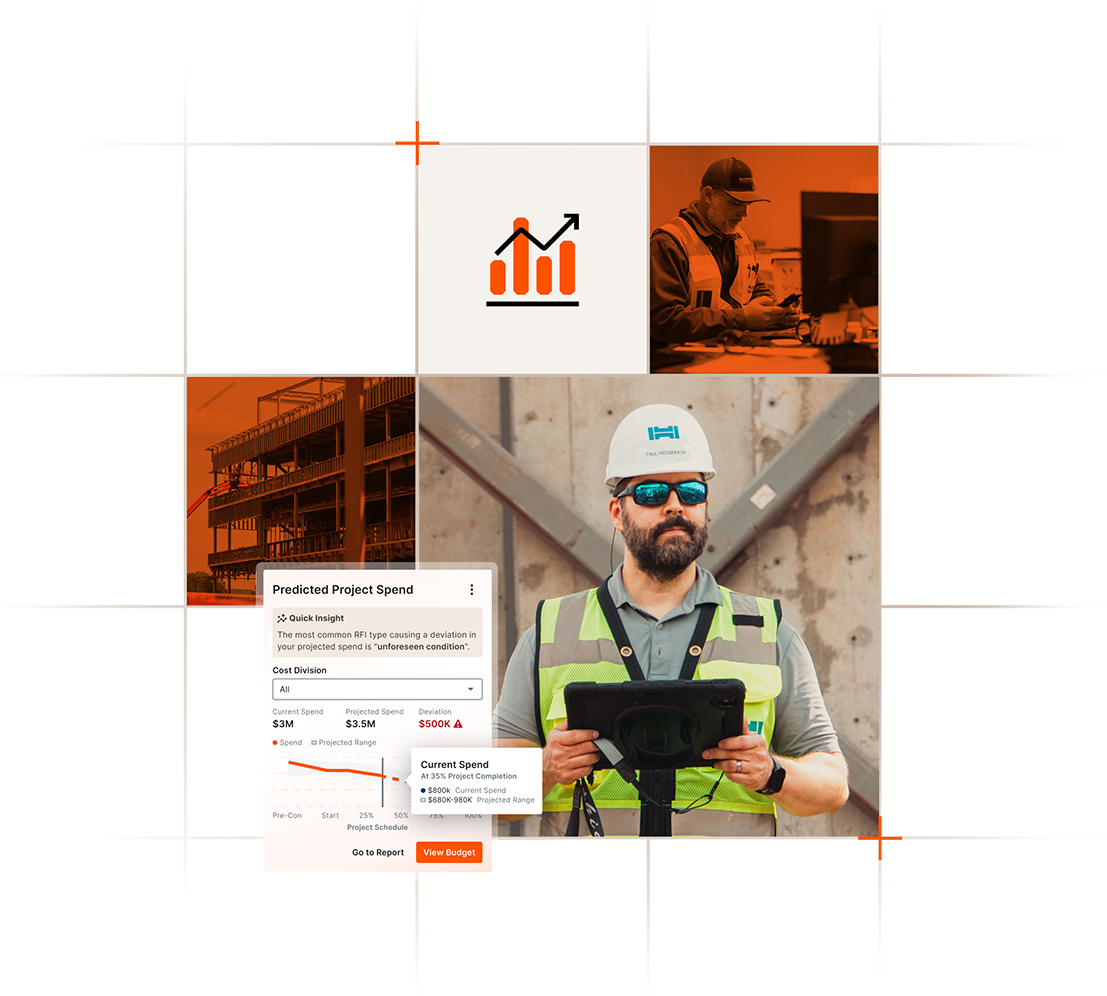— 9 min read
Accrual vs Cash Accounting in Construction: Pros & Cons


Last Updated Oct 3, 2025

Brittney Abell
Manager, Strategic Product Consultants
14 articles
Brittney Abell joined Procore after 6 years as an accounting manager for a commercial general contractor, overseeing accounts payable and receivable. Before that, she worked as a contract administrator for an architecture & design firm for 6 years. She has worked on a variety of building projects, including travel stops, restaurants, hotels, and retail warehouses raging from $2M to $20M. She lives in Louisville, Kentucky

Kristen Frisa
Contributing Writer
113 articles
Kristen Frisa is a contributing writer for Procore. She also contributes to a variety of industry publications as a freelance writer focused on finance and construction technology. Kristen holds a Bachelor of Arts in Philosophy and History from Western University, with a post-graduate certificate in journalism from Sheridan College. She lives in Ontario, Canada.
Last Updated Oct 3, 2025

In the beginning stages of a construction business, accounting can be simple math: recognizing revenue when it’s received with cash accounting methods. But, as the business grows and takes on larger projects, accounting quickly becomes much more complicated. When juggling industry billing standards, contract types and cash flow, businesses will eventually need to start recognizing revenue before it is received to keep accurate records. This method is called accrual accounting.
This article will cover the differences between accrual and cash accounting methods, when to use them and why.
Table of contents
What is cash accounting?
The cash accounting method is the simplest method of accounting, because it only tracks cash transactions. When money changes hands, it goes into the ledger. With the cash method, revenues are recorded when payments are received, not when billed.
Cash accounting is often used by smaller construction companies who are legally, under IRS tax laws, allowed to use this method. The IRS limits its use because it can be used to defer income taxes on money not yet received. Most individuals use this method to calculate their taxes. Generally, it is only allowed for companies that average less than $25 million in revenue over the last three years and who complete their jobs in two years or less.
Benefits and Challenges of Cash Accounting
| Benefits | Challenges |
|---|---|
| Real-time financial view | Limited cash flow insight |
| Simple for teams to adapt | Only smaller contractors are eligible |
| Can defer income taxes | Less accurate month-end and forecasting |
| Incompatible with percentage of completion billing |
Benefits of Cash Accounting
Cash accounting is intuitive and gives a real-time view of construction finances.
Simplicity
Unlike the constant movement of numbers that accrual accounting demands, cash accounting is extremely simplistic: When cash comes in or goes out, the amounts appear on the register. For small office teams, cash accounting is easy to understand and implement.
Defer Income Taxes
Taxes paid in any given year are based on the amount of money a business earns, minus the expenses it took to earn that money. Contractors may find that some months, quarters, or even years are far more profitable than others. Cash accounting can let contractors tinker with the numbers to benefit their tax burdens, like by deferring some income from one period to another.
Challenges of Cash Accounting
For most construction companies, cash accounting doesn’t work because it does not reflect the construction company’s current financial condition: It gives the least accurate picture of a company’s finances, and many financial institutions, such as banks, do not accept financial statements based on the cash method.
Incompatible with Percentage of Completion Billing Methods
In large, long-term projects where work is continuous and progress is measured reliably over time, contracts often require general contractors to bill based on the project’s progress. The percentage of completion method recognizes revenue based on the progress of the construction project. However, cash accounting records revenue only when cash is received. This mismatch can lead to significant discrepancies in reported revenue versus actual project progress, making it difficult to accurately assess the project's financial performance at any given time.
Less Accurate Month-End and Forecasting
Accounting is all about making a financial trail that accurately reflects the activities of a business. Every month, the accounting team tries to match up paid invoices with outgoing payments to close out the month. With cash accounting, the timing might not always match up.
For instance, work completed in October that the contractor billed for the same month may not get paid until December when cash accounting would track the payment. Trying to match up payment with the invoice at year-end to tidily close out the month gets complicated.
Because the money is tracked when it's paid, not when the work is complete, the cash accounting system skews the numbers, so they won't provide that clear record of the busy and slow periods of the year that the accrual method provides.
Only Applicable to Smaller Contractors
Cash accounting may only be used by contractors who earn less than $25 million annually. Contractors earning above that threshold are required to use accrual accounting. That means firms accustomed to a cash system will have to adjust when they reach that threshold.
Cash Flow
Cash accounting gives limited insight into future cash flow, as it does not account for receivables and payables. This can make it difficult to manage cash flow effectively in a construction project, where timing of cash inflows and outflows is crucial. Unfortunately, by the time a company using cash accounting recognizes a cash flow problem, it’s often too late to do anything about it.
What is accrual accounting?
The accrual method offers a forward-looking view of a company’s finances by recognizing revenues and expenses as soon as bills are sent and received. For example, a construction company that has sent a bill for payment will record it as revenue even though the payment itself has not yet been received. Similarly, when the business receives a bill from a vendor or supplier, it will be recorded as an expense even if payment hasn’t yet been sent.
Notably, construction companies whose contracts include retainage typically do not recognize that revenue until a project is fully completed — which is usually when they first have the right to receive that payment.
Accrual accounting is generally more complex than cash accounting because it involves tracking revenues and expenses in and out of various columns before they're finally settled. For that reason, smaller construction firms that lack a full administrative team may opt out of accrual accounting if they can. However, contracting firms that earn $25 million or more in average gross receipts over the prior three-year accounting period are required to use the accrual method of accounting.
What is WIP?
Accounting teams rely heavily on the Work in Progress (WIP) report from the field to match up invoices and expenses every month. The WIP helps demonstrate the project's progress and compares it to the current budget. In this way, it can indicate if a project is overbilled (a greater portion has been paid for than completed) or underbilled (when billing has fallen behind progress.)
A WIP uses the projected cost at completion and actual costs to date to calculate the completed percentage of the project.
Benefits and Challenges of Accrual Accounting
| Benefits | Challenges |
|---|---|
| Better view of financial standing | Larger accounting effort |
| Better view of current/overall workload | Late invoices impact accounting |
| Tracking retainage | No chance to defer tax payment |
Benefits of Accrual Accounting
Most larger contractors use accrual accounting. The effort it takes to maintain pays off with better insights into current and future business health.
Provides a Better View of Financial Standing
Because accrual accounting registers payments in and out as soon as the bill comes in, they offer a real sense of the current financial situation. As soon as an invoice arrives, it's counted as paid, so it's easy to see that the money's out the door. If the totals look low, it's clear the business shouldn't spend more money.
Better Overview of the Current and Overall Workload
As soon as a contractor completes a section of work, the office staff sends an invoice for it. Accrual accounting marks down that payment as soon as the invoice is sent.
The result is a full record of each task and how long it takes, which can help contractors understand their regular business flow. Familiarity with busy times and slower times can educate hiring practices and improve operations for a healthier business overall.
Retainage
Accrual accounting aligns expenses and revenues with the related project phase or period, offering a more accurate financial picture. Because retention is not recognized as a revenue or expense until the completion of the project, it can be tricky to account for no matter what accounting method you are using.
With accrual accounting, retainage amounts due to subcontractors can be recorded as a liability (Retainage Payable), while amounts to be received from clients can be noted as an asset (Retainage Receivable). This clear distinction helps in tracking these amounts more efficiently.
Challenges of Accrual Accounting
Accrual accounting is a more regimented method of accounting that paints a clearer picture of available operational funds, but the logistics of its implementation can be daunting.
Accounting Effort
When accountants use accrual accounting to track funds in and out of a business, they may have to adjust the numbers between columns multiple times before any revenue or expense is settled for good. In a typical month, the administrative staff must understand, organize, and log each month's expenses, labor, and materials.
Since money hasn't actually changed hands for many of the entries, the staff then has to revisit the log to reconcile which items have been settled and which haven't. Some items will be revisited in the log many times before they're settled and can be cleared from the log. Given the number of items during any given month, the effort to keep up can be colossal.
Late Invoices Impact Accounting
Late invoices become problematic for accounting teams, because they need to balance out the bills due for materials and labor. As a result, contractors find themselves pushing their subs for timely invoices so that they can pay the bill and balance out the income showing up in the accounts.
No Chance to Defer Tax Payment
Because accrual accounting counts the income as soon as a bill is paid, contractors may have to pay taxes on income that they haven't actually received yet, which could impact the firm's cash flow.
A Cash/Accrual Hybrid?
Though the accrual or cash accounting systems provide the official financial records for a contracting company, many companies may keep documents to help get a fuller picture of their finances regardless of which system they use.
A contractor using the cash accounting method still needs to be aware of and retain funds for upcoming bills. So, while the official accounting system may only reflect a bill when the office sends a payment, contractors may use another document to track money that will be coming in and out of the business.
Similarly, the accrual method accounts for a payment as soon as the bill arrives, but the payment may not go out just yet. That contractor will still have to keep track of and reconcile the payment when the money actually moves.
About Communication Between Field and Office
Regardless of the accounting method in place, administrative teams always benefit from clear communication from the field. Accurate and timely notice about the work currently underway will give accounting staff a heads-up about which vendors will be sending invoices and how to match that up with the ongoing work. Construction management software can help bring all communication together with the financials and project documents to help keep everything straight.
The Impact of Great Construction Accounting
Accounting done right can keep construction companies with their cash flow and budget adherence and help educate bidding, accurate forecasting, and scheduling on future projects. An accounting system that includes thorough communication between the field and office is important for a contractor's present and future financial health.
NOV 6, 2025 at 11:00 AM PST / 2:00 PM EST
Free Webinar: Prove your project management software is profitable
Join Procore and Dodge Data & Analytics for a 2025 Dodge ROI Report deep dive.

Was this article helpful?
Thank you for your submission.
100%
0%
You voted that this article was . Was this a mistake? If so, change your vote
Scroll less, learn more about construction.
Subscribe to The Blueprint, Procore’s construction newsletter, to get content from industry experts delivered straight to your inbox.
By clicking this button, you agree to our Privacy Notice and Terms of Service.
Thank you!
You’re signed up to receive The Blueprint newsletter from Procore. You can unsubscribe at any time.
Categories:
Written by

Brittney Abell
Manager, Strategic Product Consultants | Procore
14 articles
Brittney Abell joined Procore after 6 years as an accounting manager for a commercial general contractor, overseeing accounts payable and receivable. Before that, she worked as a contract administrator for an architecture & design firm for 6 years. She has worked on a variety of building projects, including travel stops, restaurants, hotels, and retail warehouses raging from $2M to $20M. She lives in Louisville, Kentucky
View profile
Kristen Frisa
Contributing Writer | Procore
113 articles
Kristen Frisa is a contributing writer for Procore. She also contributes to a variety of industry publications as a freelance writer focused on finance and construction technology. Kristen holds a Bachelor of Arts in Philosophy and History from Western University, with a post-graduate certificate in journalism from Sheridan College. She lives in Ontario, Canada.
View profileExplore more helpful resources

6 Tips to Turn Construction Culture Into Daily Practice
Every construction company has a culture. Whether it’s intentional or not. The difference lies in how that culture shows up on the job. In the first article of this series on...

Turning Values into Workflows: How a GC Firm Operationalized Culture
Culture isn’t just about what companies believ — it’s about how those beliefs show up in day-to-day work. When culture is embedded into operations, it becomes something teams can rely...

How a Successful GC Firm Turned Personalities into Culture
The culture at Ryan Gootee General Contractors (RGGC), a successful construction firm based in New Orleans, was never something the company had to invent. It was always there. Woven into...

Rise of the Super-Sub: Mastering Supply Chain & Logistics for Offsite Construction
Modern construction projects come with ever-increasing demands. Owners want to see more complex builds completed on tighter schedules. At the same time, general contractors (GCs) face challenges like the ongoing...
Free Tools
Calculators
Use our calculators to estimate the cost of construction materials for your next project.
Templates
Find a template to help you with your construction project tasks.
Material Price Tracker
Get the latest U.S. retail prices and view historical trends for common building materials.
Glossary
Explore key terms and phrases used in the industry.
